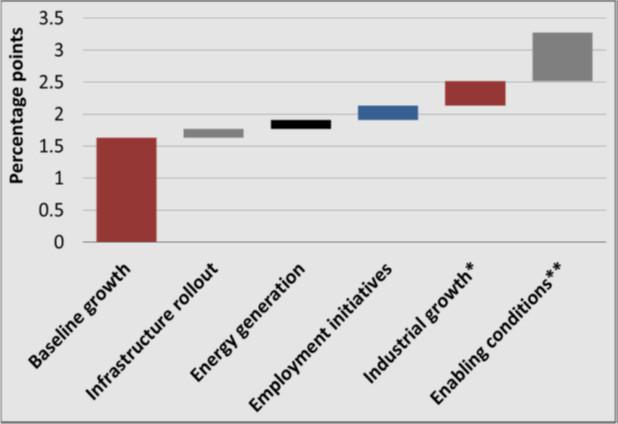(Extract from the Medium Term Budget Policy Statement)
The economic recovery plan was developed through extensive consultations between government, business, labour and civil society. It has two broad components.
A range of immediate and short-term measures will be taken to rebuild confidence, kick-start the economy and continue to mitigate the effects of the pandemic. And structural reforms will promote faster, more inclusive growth and employment over the medium to long term. Many of these reforms are drawn from government’s long-term structural reform agenda as outlined in the discussion paper that the National Treasury released in 2019 – Economic Transformation, Inclusive Growth, and Competitiveness: Towards an Economic Strategy for South Africa. Parliament approved the plan on 15 October 2020.
In the short term, the plan will focus on rolling out infrastructure, expanding energy generation capacity, creating mass public employment and supporting rapid industrialisation. At the same time, government will implement structural reforms such as modernising network industries, reducing barriers to entry, and increasing regional integration and trade. The National Treasury estimates that reforms in these areas can raise growth to over 3 per cent over the next 10 years and create more than 1 million jobs.
The plan is accompanied by a detailed implementation schedule that will be overseen by a council chaired by the President. It will be supported by a leadership team that coordinates reporting and identifies areas where more effective partnerships are required.
Economic recovery plan effects on growth by 2030
*Agriculture and industrial initiatives
**Reducing barriers to entry, easing the skills constraint and implementing tourism initiatives
Source: National Treasury projections.
Operation Vulindlela: implementing structural reforms
Many of the proposed reforms in the economic recovery plan and their potential benefits have been detailed in recent editions of the Budget Review and Medium Term Budget Policy Statement. Yet implementation has been delayed by a lack of agreement over proposed reforms, a failure to prioritise and sequence reforms that have been agreed on, and lack of capacity in government. Operation Vulindlela will support the implementation of the economic recovery plan by accelerating priority structural reforms. It is based on similar “delivery unit” initiatives in countries such as the United Kingdom and Malaysia, as well as lessons learnt in South Africa. The initiative will be staffed by a full-time technical team that draws on additional expertise and capacity in the public and private sectors. The team will assist the economic cluster, Cabinet and the President to coordinate and accelerate the implementation of a limited number of priority reforms.

